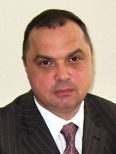Chairman of the Helsinki Commission
![]()
1 July 2008 - 30 June 2010

Igor Ivanovich MAYDANOV
Implementation of the HELCOM Baltic Sea Action Plan – the highest political priority in the region
Statement by Mr. Maydanov upon assuming the Chairmanship of HELCOM
Under the Russian Chairmanship, the Helsinki Commission will continue to be the focal point for the protection of the Baltic Sea Marine Environment. On taking the Chairmanship of HELCOM, the Russian Federation fully recognises its responsibilities over the coming period, including the commencement of the implementation of the HELCOM Baltic Sea Action Plan which is considered as a top political priority in the region. Building on the achievements of the Polish Chairmanship, during which this strategic programme was developed and adopted, Russia will ensure the wider participation of various stakeholders in the implementation of the action plan, as well as the realisation of all the necessary measures to ensure the sustainability of the recovery process of the Baltic marine ecosystem.
The development and adoption of the HELCOM Baltic Sea Action Plan confirmed the readiness of the Baltic Sea countries to implement a joint environmental protection strategy in the region, aimed at its sustainable development. However, despite this common readiness and the efforts of all countries, we still face many challenges along the road to a healthy Baltic Sea.
The action plan focuses on the region’s most urgent environmental problems, and is in many ways linked to the European and international programmes that regulate activities in the common European space. Therefore, one of our main tasks over the coming two years is to pro-actively get all interested stakeholders involved in dialogues at the regional and Pan-European levels to provide permanent political support for reaching the environmental goals of the plan, and to mobilise the necessary resources. The commitment of Heads of State and Governments to the implementation of the action plan will maintain momentum, accelerate the development of national programmes of action, and ensure appropriate financing is allocated for their implementation.
The timeframe for the implementation of the HELCOM Baltic Sea Action Plan is in practice quite limited. A suitable methodology for prioritising projects designed to meet the goals of the plan both at the national level and the level of the whole Baltic Sea region should therefore be developed as soon as possible, together with approaches to mobilise and combine financial, human and other resources. It is clear that during this period great responsibility will lie on the shoulders of the Baltic Sea Action Plan Implementation Group.
A programme of actions designed to reduce pollution outside HELCOM countries should be also developed over the coming two years, since significant pollution reaches the Baltic Sea via transboundary waters or in the form of long-range airborne pollution. In this work we shall actively use bilateral and multilateral projects, existing financing mechanisms, and international agreements such as the Convention on the Protection and Use of Transboundary Watercourses and International Lakes.
Another important issue on the agenda requiring thorough discussion is the application of economic tools to stimulate reductions in nutrient inputs, including nutrient credit trading. The Baltic Sea countries all wish to have quotas reliably and scientifically based, so the actions necessary to organise the monitoring and assessment of nutrient inputs should be taken by all the HELCOM Contracting Parties.
One of HELCOM’s goals is to raise public awareness, and during the action plan’s implementation period such work will be carried out in close co-operation with NGOs, in recognition of their important role in the process of preparation of the document, as well as their readiness to continue such collaboration. To ensure the wide participation of various stakeholders in discussions concerning the implementation of the action plan, we shall exploit the International Environmental Forum known as the “Baltic Sea Day”, whose usefulness has been widely acknowledged by the Baltic Sea countries.
One sea and a common European space unite us. Ultimately the world itself is not that big, and we should also seek to apply our Baltic experiences, knowledge and priorities not only at the European level, but also globally.
We hope that joint activities will help to find efficient and balanced approaches for the successful implementation of prioritised goals, and also create appropriate and worthy responses to the new challenges we now face, in the same way that HELCOM has responded to challenges many times in the past.
Curriculum vitae
Age: 46
Position: Director, Department for International Cooperation of the Ministry of Natural Resources and Environment of the Russian Federation.
Education: M. Sc., Moscow State Institute of International Relations (University) of the Ministry for Foreign Affairs, dipl. International Relations, 1984.
Language: English (fluent), Urdu (fluent), Hindi (good), Russian (mother language)
Career: Mr. Maydanov has seniority in the field of international relations and environment protection and natural resources management cooperation.
Mr. Maydanov started his career in 1984 at the Ministry of Foreign Affairs of the Russian Federation. He has great experience working as a diplomat in several Russian embassies abroad. In 2006, he was appointed Director of the Department for International Cooperation of the Ministry of Natural Resources and Environment of the Russian Federation. At the same time he took over several additional international and national duties. He has participated in the meeting of European Union and the Russian Federation Permanent Partnership Council on Environment, 2nd Stakeholder Conference on the HELCOM Baltic Sea Action Plan (2007), 28th annual Meeting of HELCOM as Head of the Russian delegation.
Mr. Maydanov has vast experience in chairing international meetings. He is a Co-chair of Intergovernmental Committees on Trade and Economic Cooperation of the Russian Federation with South Africa, Angola, Namibia and Guinea, the political focal point for the Russian Federation, Armenia and Belarus in the Global Environment Facility, Chair of the negotiation process with the Republic of China on transboundary watercourses issues, member of the International Law Commission of the Russian non-government organization "Association of Russian Lawyers".
Family: wife Tatiana and son Nikita (16).
Hobby: South African history, diving, music.

